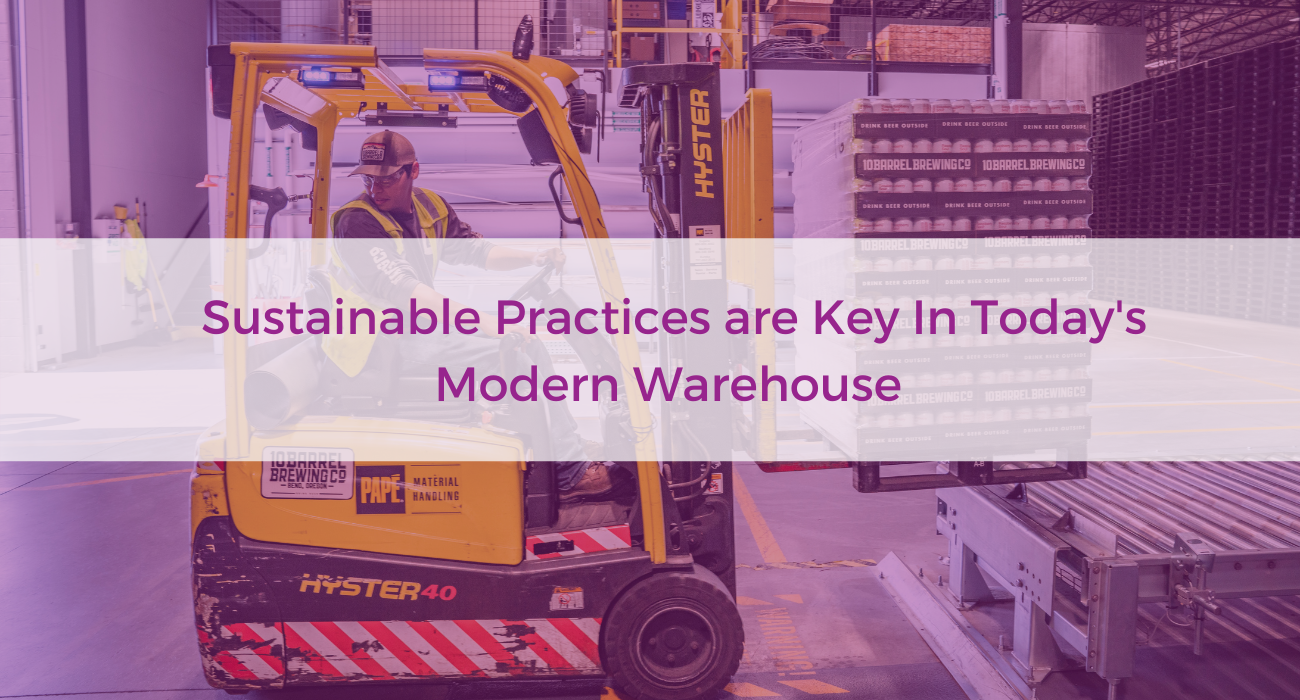
Sustainable Practices are Key In Today’s Modern Warehouse
Sustainability is at the forefront of a majority of companies priority lists, especially as it continues to dominate media and business agendas. More businesses are considering how they can optimise business risk, environmental concerns, and waste cost in their supply chain to achieve sustainable operations. As businesses strive to be more sustainable, what steps can they take to meet these requirements and benefit economically?
Starting the Sustainability Journey
There are two key elements to consider when it comes to sustainability within supply chains, particularly in the warehouse.
- Environmental: Environmental factors often get the most media attention, with government pressure higher than ever on companies to reduce their carbon footprints. The removal of Red Diesel in 2022, for instance, means that many companies will need to quickly overhaul their diesel equipment and consider more energy-efficient alternatives. But investing in environmental corporate social responsibility (CSR) efforts may unlock significant financial benefits. For example, businesses that use lithium-ion batteries for materials handling equipment have found that having a beneficial impact on the environment can lead to financial gain.
- Economical: There are various challenging measures that corporations are pushed to adopt, such as abandoning fossil fuels, rather than phasing in changes. In today’s competitive industry and turbulent economic environment, most factories need to readjust their strategy to produce as many products as possible at a minimal cost. The goal is to make the production process more efficient, productive and ultimately – sustainable. So, what remedies can businesses take to improve not just their environmental credentials, but also their bottom line?
Automation Acceleration
COVID-19 and the global economic shutdown that followed accelerated the need for smooth, seamless operations. Companies are also ensuring that they are prepared for any disruptive events that might occur in the future. Therefore, today’s warehouses must look to find ways to operate effortlessly and economically, while adhering to new post-pandemic health and safety protocols.
The pandemic has uncovered inefficiencies across warehouses and supply chains. In spite of this, warehouse managers have used these hurdles as the catalyst to adopt automation technologies, which have allowed them to adapt to peaks in demand and maximise productivity. Automating warehouses creates a lot of value, with robots taking over mundane tasks, such as picking, packing, and transporting. In addition to an immediate return on investment and continuity during a crisis like COVID-19, this will help accomplish long-term business goals.
Reduce, Reuse, Recycle
Lithium-ion is at the forefront of the electric transport and energy storage revolution. Businesses already using lithium-ion can continue to demonstrate and grow their environmental credentials through productivity and efficiency gains. As with all batteries, those from electric vehicles are eventually destined for recycling.
By deploying lithium-ion batteries in secondary market applications, such as wall chargers that utilise second-life batteries to supplement grid power, the environmental footprint created by the manufacture of lithium-ion batteries can be dramatically reduced. Particularly with lithium-ion batteries, it allows the equipment to function for a longer period of time with a higher energy density – increasing the equipment’s lifespan and contributing to the company’s sustainability goals.
Increasing global competition, escalating consumer demands, rising personnel costs, and increasing environmental regulations are just a few of the obstacles faced by businesses. But by incorporating environmental, social, and economic perspectives into business strategy planning, organisations can identify environmentally friendly and efficient means of dealing with challenges, which will enable them to achieve all-around sustainability in their operations.




